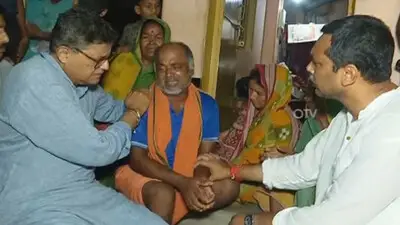Recommended Stories
"Since the 1989 VP Singh government, three bills were brought on Lokpal. ... Also in 1996 and 2001. All of them provided for placing the PM under the Lokpal. It is surprising that the UPA government is refusing to accept this", CPI(M) General Secretary Prakash Karat told a press conference here.
Maintaining that all the three bills were brought during non-Congress governments, he said a Parliamentary Standing Committee headed by Pranab Mukherjee "had made precisely this point" while examining the 2001 Lokpal bill that the Prime Minister should be included.
"What has changed since then? Is it because that under the UPA government, so many major scams are taking place? They will have to tell us why they had agreed to bring PM under the Lokpal purview earlier", Karat said in response to a question.
He said Left parties "insist" that the Prime Minister should be included as after all the PM was "not immune to the Prevention of Corruption Act".
He termed as "ridiculous" the view of a section of Congress that action against the Prime Minister can be initiated only after he or she demited office.
He, however, said there should be "adequate safeguards" regarding how the complaints against the PM should be dealt with, especially on matters concerning national security or relations with other countries.
Left parties, he said, would attend the all-party meeting on the issue tomorrow but since the government has not given its own draft so far, "we will give our views only when we get it. We have several related issues to raise."
Asked about the Lokpal bill drafting committee comprising some ministers and the team led by Anna Hazare, Karat said "if you think you can bypass Parliament and political parties, you are mistaken. That will not happen".
Asked whether the Left has agreed with the Jan Lokpal Bill prepared by Hazare`s team, Karat said there have been several drafts by many NGOs and others on the issue. "After studying all of them, we have come to our own conclusions. We agree with some proposals, we disagree with some others".
On bringing the MPs under the purview of the bill, he referred to the JMM Bribery case during the PV Narasimha Rao rule and said the system of scrutiny of the conduct of MPs at present was "weak and unsatisfactory". Amending Article 105, which protects their freedom of speech and voting, should be amended to check acts of corruption by MPs.
Pointing out that corruption in high places has become a feature of the political system after economic liberalisation, Karat said what has emerged as a dominant trend was "a thorough distortion of the policy-making process at the highest levels of the government".
"A nexus of big corporates, politicians and bureaucrats have matured under the neoliberal regime and is threatening to subvert our democracy. It is clear that the current economic regime has made our system more vulnerable to cronyism and criminality", Karat said.
Speaking on the "big business-public servant nexus", he said the Lokpal should have powers to recommend blacklisting of "corrupt" firms from getting government contracts and concrete measures to recover losses caused to the public exchequer by their acts.
Karat also sought windening of the definition of corruption saying it involves a whole range of activities from bribery, influence peddling, patronage or favour, nepotism, cronyism, electoral fraud, embezzlement, kickbacks to officials and involvement in organized crime.
Suggesting that Lok Ayuktas should be set up in states on the model of the Central Lokpal, Karat also wanted protection of whistleblowers by immediately enacting laws to strengthen the Public Interest Disclosure (Protection of Information) Bill, 2010.
Along with the law to set up an independent and effective Lokpal, simultaneous measures have to be taken to strengthen the legal and administrative framework to fight corruption, he said.
These include setting up of a National Judicial Commission to deal with the conduct of the judiciary, a law to protect citizens charter for redressal of public grievances, electoral reforms to check money power in elections, amending Article 105 of the Constitution to bring MPs under anti- corruption scrutiny and setting up of Lok Ayuktas in states to cover all public servants at the state-level.
Steps should also be taken to unearth black money and confiscate the funds illegally stashed away in tax havens.












